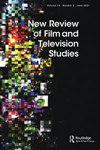Feng Xiaogang’s haunted utopia, Chinese modernity, and carnivalesque social critique in the era of Xi Jinping
IF 0.5
2区 艺术学
0 FILM, RADIO, TELEVISION
引用次数: 0
Abstract
ABTRACT This paper seeks to illustrate how Chinese film director Feng Xiaogang constructs and delivers social commentaries in his New Year comedies The Dream Factory (1997) and Personal Tailor (2013). These two films are unique in terms of narrative strategy compared to his other New Year films. Both films turn on the premise of temporarily granting people’s wildest wishes, out of which arise multi-layered utopian and dystopian elements that I connect to Feng having made these two films shortly after his realist films were censored. Exploring these two films, I argue that Feng employs the carnivalesque as an alternative narrative strategy to perform subversive resistance, to counter monolithic and hegemonic discourses of Chinese modernity, and to expose social issues in the context of China’s tightening of censorship restrictions. A comparative study of these two films reveals their value as visual records of Chinese modernity over the course of a decade and as important facilitators or mediators of societal self-critique.摘要本文试图说明中国电影导演冯小刚是如何在他的贺岁喜剧《梦工厂》(1997)和《贴身裁缝》(2013)中构建和发表社会评论的。与他的其他贺岁电影相比,这两部电影在叙事策略上是独一无二的。这两部电影都以暂时满足人们最疯狂的愿望为前提,由此产生了多层乌托邦和反乌托邦元素,我认为冯在现实主义电影被审查后不久就拍了这两部影片。探讨这两部电影,我认为冯将狂欢节作为一种替代叙事策略,以进行颠覆性的抵抗,对抗中国现代性的铁板一块和霸权话语,并在中国收紧审查限制的背景下揭露社会问题。对这两部电影的比较研究揭示了它们作为十年来中国现代性的视觉记录,以及作为社会自我批判的重要推动者或媒介的价值。
本文章由计算机程序翻译,如有差异,请以英文原文为准。
求助全文
约1分钟内获得全文
求助全文
来源期刊

New Review of Film and Television Studies
FILM, RADIO, TELEVISION-
CiteScore
0.50
自引率
0.00%
发文量
43
 求助内容:
求助内容: 应助结果提醒方式:
应助结果提醒方式:


